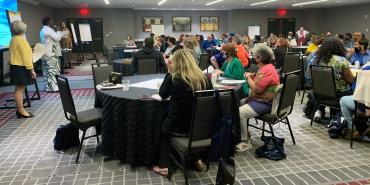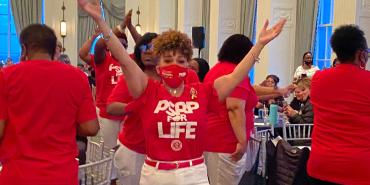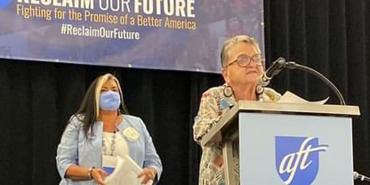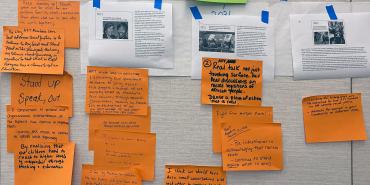During a joyful reunion in St. Louis, hundreds of AFT members who work as paraprofessionals and school-related personnel reconnected in person for the first time since 2019. These champions of public education doubled down on their resolve to win the respect and recognition they deserve.
The three-day conference April 22-24 began with an orientation for first-time attendees, which this year made up roughly a third of participants, along with mini plenary sessions on practical topics like how to run an issue campaign, tips for new leaders and how to organize and build community.
Because school and college support staff have dozens of job titles, they continued the tradition of holding breakout sessions by classification, from food service workers to bus drivers, from family liaisons to computer techs, from clerical and administrative staff to maintenance and custodial employees. And because so many PSRPs work as paraprofessionals, paras got to pick from four different flavors: two grade ranges and two kinds of special education paras.
There were workshops galore. Some were all-in-one, like working with medically fragile children and using digital tools to organize. Others built on each other, such as a series on advancing racial justice.
PSRP leaders Kathy Chavez of New Mexico, David Gray of Oklahoma and Carl Williams of California, all AFT vice presidents, stepped up to help as emcees and moderators. And of course, there were in-person and video visits from all three AFT national officers.
“If you’ve noticed, within our union and the United States, bus drivers, food service workers, paraprofessionals … the family of helpers in education are now out there in the public discourse,” AFT President Randi Weingarten told the crowd during the opening general session. “That was something that I promised you a few years ago I would be really intentional about—[lifting up members] every time we see a bus driver, a school secretary or paraprofessional.”
Weingarten praised support staff for their roles during the pandemic, from quelling the chaos to soothing the trauma. “Other than parents and caregivers, who are the people who actually have to deal with the effects? It’s you,” she said. “You’re the ones who students have every single day. The truth is that parents and communities can’t do it without you.”
But she also warned that we live in dangerous times, with authoritarians trying to suppress democracy and seize power all over the world. “We may not just lose public education—we may lose our whole way of life,” she said. “I am haunted by what a boy, a Ukrainian refugee, told me when I was in Poland: ‘Please tell American children that I had what they had last month.’ And then everything changed.”
The AFT president urged members to advocate for forms of public education that work particularly well, like community schools. And as others try to ban books, she said, help the AFT promote literacy through our Reading Opens the World campaign.
PSRP chair Shelvy Abrams, who leads United Federation of Teachers paraprofessionals in New York City, greeted members virtually.
“PSRPs are championing the promise and purpose of public education,” she said. “I don’t care what you call yourself, whether it is PSRP, school or college support staff, classified employees, SRP or ESP, you all are what make our schools and colleges run.” It’s been a hard couple of years, she added, “and while we can’t gloss over how emotionally and mentally draining these years have been, we still need to find our joy and remind ourselves of why we do this work.”
The PSRPs did find their joy. They did it by recognizing the amazing achievements of their local affiliates, by bestowing AFT PSRP’s highest honor to an individual leader, and by reviving the great PSRP tradition of Solidarity Night.
The PSRPs cheered members of their host city, St. Louis, for winning $15 an hour for all support staff, and they celebrated PSRPs in Cleveland for getting a licensed practical nurse in every school.
Then they moved on to the Albert Shanker Pioneer Award, the highest PSRP honor, this year given to Catherine Mastronardi, president of the Springfield (Mass.) Federation of Paraprofessionals. Abrams highlighted a few of Mastronardi’s many accomplishments: winning paid professional development, building an activist union and activating community support. “No matter who you ask, the winner of this year’s award is recognized as a force to be reckoned with,” Abrams said. When the school district threw crumbs, Mastronardi shot back with her union’s rebuttal: “2 percent don’t make a dent!”
This year’s Lorretta Johnson Solidarity Award went to two Minnesota locals that exemplified the spirit of solidarity: the Saint Paul Federation of Educators and Minneapolis Federation of Teachers and Educational Support Professionals.
More awards followed: The Dorothea Bell Political Action Award went to AFT New Mexico and to the Oregon School Employees Association. The PSRP Advocacy Award went to Jeff Whittle, president of the Macomb (Mich.) ISD Federation of Paraprofessionals. The member engagement and professional development award went to the Florida Education Association for its member trainings.
For outsized gains this past year, AFT PSRP presented several locals with the 2022 PSRP Achievement Award: the Hartford (Conn.) Federation of Paraeducators for its safe reopening plan; the Kansas City Federation of Teachers and School-Related Personnel, which beat the federal government to making Juneteenth a holiday; the New Bedford (Mass.) Federation of Paraprofessionals for thwarting a charter operator that would have siphoned off $10 million from public schools; the Pinellas (Fla.) Educational Support Professionals Association for its grit in securing pay hikes and bonuses; and the Toledo Federation of Teachers for negotiating a lucrative new compensation system for paraprofessionals.
AFT Executive Vice President Evelyn DeJesus delivered an impassioned speech on the purpose of public education. Because of PSRPs, students know they are loved, respected and cared for, said DeJesus, who once was a paraprofessional herself. She described custodians’ work at a high school in the Rio Grande Valley where the AFT held citizenship clinics and a book distribution. The custodians stayed up late making sure the book display was set up beautifully, and they remained on site the next day to help the clinics run smoothly.
“Together we can achieve so much more than we could ever achieve alone,” DeJesus said. “As we say in Spanish, Vamanos! Let’s go!”
Special education in crisis
Staff shortages across job classifications are the single biggest issue facing PSRPs this year. During one breakout session, special ed paras poured their hearts out about the severity of students’ behaviors leading newly hired paras to quit on a moment’s notice or no notice at all.
One para explained how all students at her school are now assessed as moderately to severely impaired and that some classrooms have become purely about health and safety management instead of education.
In many districts, paras still are excluded from the IEP process. Another para described how no one had shared with her the plan for a child who often cried inconsolably. This para liked to wear red. For two days in a row, however, she didn’t wear red and the child remained calm. His para thought he’d had a major turnaround, but it turned out that when he was a toddler, he had sat for hours in a pool of his mother’s blood. The fact that the color red triggered him was in his IEP. She hadn’t been told.
Another para described some implications of high staff turnover. Normally, her district provides professional development before school starts in the fall. But when paras are “in and out the door,” training needs to be provided whenever someone is hired, not just once a year.
Between staff shortages and lack of training, participants asked, how is it possible that they are still not on IEP teams and in meetings? Some said they’re no longer even part of parent-teacher conferences.
One thing they need, the members agreed, is overtime pay, whether for meetings or training. “If you were a plumber and had to work past 5 p.m., what would you get? Paid!” a para said. “Pay people for training! How would that be? We’re the only professionals who donate up to 40 percent of our workweek. So, they need to pay the overtime.”
The key, said a para, is getting it in the contract. Despite massive changes in recent years—including more workplace injuries and paras increasingly being ignored—PSRPs must insist on good contracts.
“Slow and steady,” the member said. “I didn’t get what I wanted, but I got some of it and I’m going to get the rest.”
“It’s power in numbers,” added another. “If we want these changes, we’re going to have to do this.”
A higher education member said his unit negotiated for bite plates, shin guards and other protective clothing. Now his administrator understands the scope of the problem and insists that PSRPs be protected. “Put it in the contract,” the member said, “because an understanding administrator won’t always be there.”
Another activist called each building rep and surveyed every teaching assistant who’d had work-related surgery. She also demanded labor-management meetings, including human resources, and hand-delivered workers’ comp applications to the superintendent.
Sandy Thompson Wallace, president of the TOTEM Association of Educational Support Personnel in Anchorage, Alaska, recommended de-escalation training. “We know our little frequent flyers who are always in the principal’s office,” she said. “Anybody can get the three-day training, and it’s very helpful.”
‘If we all got there together’
In a series of workshops on advancing racial justice, William Pritchett and Sonny Singh, both of Race Forward, explored with members the history that has shaped racial inequities in this country. Institutional racism is marked by unfair treatment, policies and practices—for example, an educational system that concentrates people of color in the most overcrowded and underfunded schools and colleges. They examined ways to overcome these deeply ingrained structures.
One paraprofessional spoke about her school, where leaders think you can give everyone the same resources and come out with the same results. She kicked off a rich discussion about a vision of society in which everyone has the dignity, resources, power and self-determination to fully thrive.
Another member described the traps of generational racism—whether in housing, education or the criminal justice system—spinning along for decades or centuries until someone says, “That’s not right.” Parents must be made aware of these traps, she said: “If we don’t see it and stop it, it will just go on.”
After examining an image of a road leading to equity for all, a third member pointed out that a single road wasn’t enough. It needed something else—more roads converging toward the horizon. “We could get there quicker,” she said, “if we all got there together.”
Leading with hope, not fear
During the final day of the conference, AFT Secretary-Treasurer Fedrick Ingram addressed participants via video. He lauded the essential roles of PSRPs, from the school secretaries and custodians who (literally) hold the keys to the higher ed administrative and tech workers who keep their institutions running. Ingram acknowledged his own father who had worked as a bus driver.
Ingram thanked the PSRPs for getting our schools and colleges through the pandemic so far and tasked them with continuing to help our nation heal “from the top to the bottom.”
Moving forward, Weingarten said, “it’s not going to be about how we study the problems. It’s going to be about how we solve the problems. We know what to do. We know what we believe in. And we know how to connect with people.” To be champions of public education, she said, we have to lead with hope and not fear: “And if that happens, my friends, we will prevail.”
[Annette Licitra]





